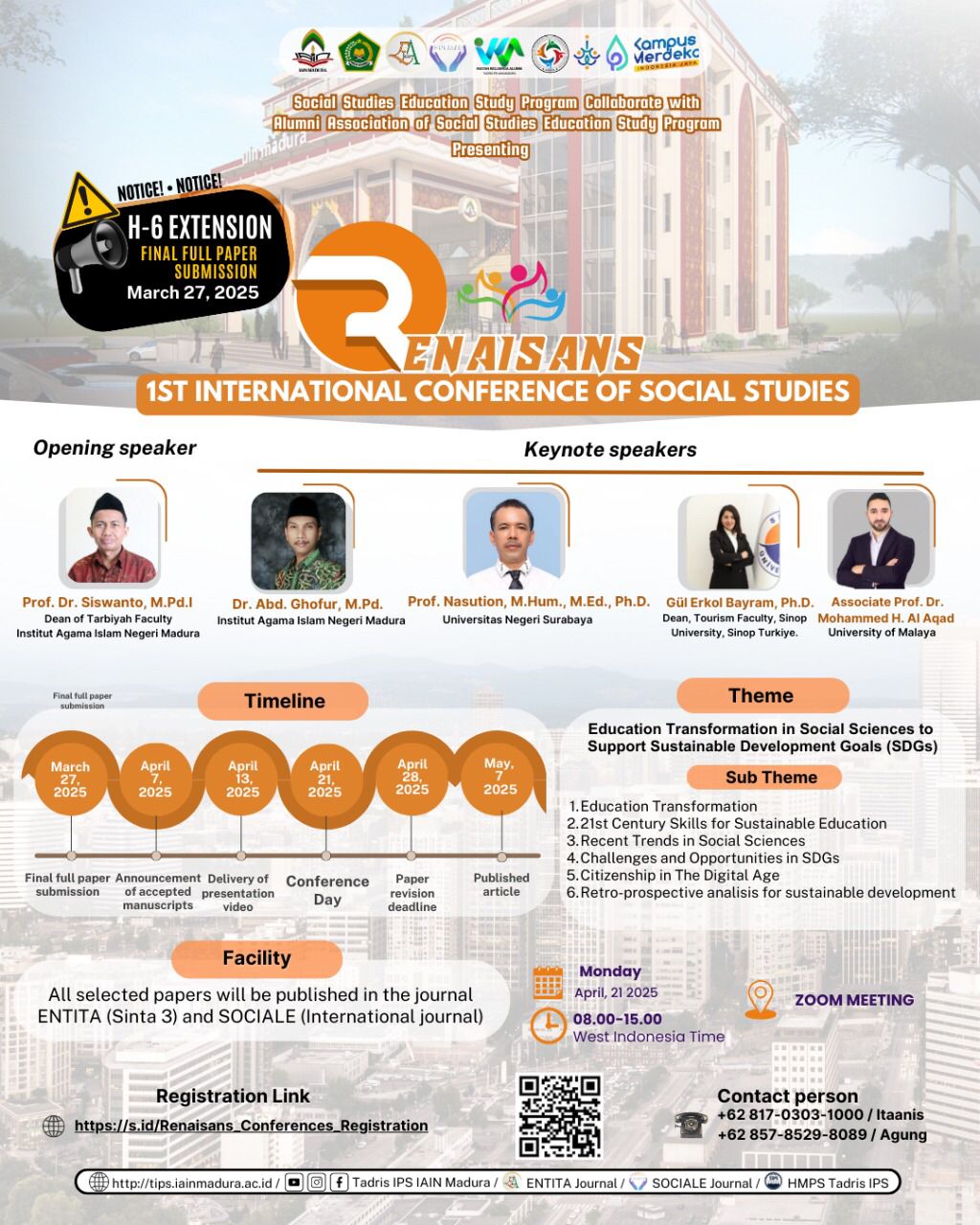Digital-Based Inclusion Education Strategy at Modern Islamic Boarding School
 Abstract views: 0
,
Abstract views: 0
,
 PDF (Bahasa Indonesia) downloads: 0
PDF (Bahasa Indonesia) downloads: 0
Abstract
Digital-based inclusive education has become a major focus in achieving the 2030 SDGs by various international organizations. Computer devices and the development of information and communication technology are currently very rapid. Most people have enjoyed this development, but there are still marginalized people such as children with disabilities, through adaptive technology, it is hoped that they can take part in learning like other normal children in an inclusive education setting. This research has an urgency to explain how the strategy of digital-based inclusion education at IBS Padepokan Kyai Mudrikah Kembang Kuning Pamekasan Madura Madura. This type of research is a case study with a qualitative approach. Data was taken from the interviews, observations and documentation which were then analyzed by means of data condensation, data display, conclusion drawing and data verification. The results of this study show that Digital based learning strategy in inclusive education held at IBS Padepokan Kyai Mudrikah Kembang Kuning Pamekasan Madura prioritizes mastery of technology in training the creativity of students. The use of technology in learning can help students with disabilities to to channel their ideas and skills in technology.
Downloads
References
Deviyanda, F., Hendriani, S., Demina, D., Imamora, M., & Fazis, M. (2023). Pelaksanaan Pendidikan Inklusif Berbasis Digital Pasca Pandemi COVID-19 di SMP Negeri 5 Kota Padang Panjang. Jurnal Pendidikan Dan Kewirausahaan, 11(1), 1–19.
Jamila, I. F., Umam, M. M., & Rizal, M. A. S. (2024). Inovasi Pembelajaran Pendidikan Agama Islam dalam Menanggapi Tantangan Pendidikan Inklusi di Sekolah Dasar. Tarbiyatuna: Jurnal Pendidikan Ilmiah, 9(2), 215–228.
Khayati, N. A., Muna, F., Oktaviani, E. D., & Hidayatullah, A. F. (2020). Peranan guru dalam pendidikan inklusif untuk pencapaian program tujuan pembangunan berkelanjutan (SDG’s). Jurnal Komunikasi Pendidikan, 4(1), 55–61.
Lexy, J. M. (2002). Metode penelitian kualitatif. Bandung: Rosda Karya, 50336–50371.
Lubis, T. C., & Mavianti, M. (2022). Penerapan Media Audio Visual Dalam Meningkatkan Motivasi Belajar Pendidikan Agama Islam Pada Anak. Jurnal Raudhah, 10(2). https://jurnaltarbiyah.uinsu.ac.id/index.php/raudhah/article/view/2004
Munir, W. (2017). Efektivitas Penggunaan Media Pembelajaran Huruf Hijaiyah Berbasis Multimedia Terhadap Kemampuan Membaca Al-Quran Peserta Didik Kelas Iii Sd Negeri 1 Parepare. http://ejurnal.iainpare.ac.id/index.php/alislah/article/view/562
Muvid, B., & Sa’diyah, H. (2024). Digitalisasi Pendidikan: Upaya Mengembangkan Inovasi Pembelajaran di Tengah Fenomena Artificial Intelligence. Global Aksara Pers.
Permendiknas RI Nomor 70 Tahun 2009—Penelusuran Google. (n.d.). Retrieved April 17, 2025, from https://www.google.com/search?q=Permendiknas+RI+Nomor+70+Tahun+2009&oq=Permendiknas++RI+Nomor+70+Tahun+2009+&gs_lcrp=EgZjaHJvbWUyBggAEEUYOdIBCTE3NjBqMGoxNagCCLACAQ&sourceid=chrome&ie=UTF-8
Ramadhani, M. M. (2023). Analisis strategi pendidikan inklusif berbasis sains dan teknologi dalam mendukung pencapaian tujuan pembangunan berkelanjutan (SDGs) 2030 di Indonesia. Seminalu, 1(1), 433–441.
Saepullah, S., Yusup, M., Amin, N., Rudini, D., & Kasmin, K. (2025). DIGITAL-BASED LEARNING TRANSFORMATION: INNOVATION AND CHALLENGES IN THE SOCIETY 5.0 ERA. International Journal of Teaching and Learning, 3(3), 65–72.
Setiawan, E. (2019). Studi Pemikiran Fatima Mernissi Tentang Kesetaraan Gender. Yinyang: Jurnal Studi Islam Gender Dan Anak, 14(2), 221–244.
Setiawan, E., & Apsari, N. C. (2019). Pendidikan Inklusif: Upaya Mewujudkan Kesetaraan dan Non Diskriminatif di Bidang Pendidikan bagi Anak Dengan Disabilitas (AdD). Sosio Informa, 5(3). https://ejournal.poltekesos.ac.id/index.php/Sosioinforma/article/view/1776
Shafira, V. S., Ramadhani, G., & Rachman, I. F. (2024). How Digital Literacy Can Drive Inclusive Progress Towards the 2030 SDGs. Advances in Economics & Financial Studies, 2(2), Article 2. https://doi.org/10.60079/aefs.v2i2.260
Supardan, H. D. (2016). Teori dan praktik pendekatan konstruktivisme dalam pembelajaran. Edunomic Jurnal Pendidikan Ekonomi, 4(1). https://www.academia.edu/download/62239329/199-388-1-SM_120200301-68210-1pyss04.pdf
Suryadi, I. (2023). Dampak pendidikan inklusif terhadap partisipasi dan prestasi siswa dengan kebutuhan khusus. Jurnal Pendidikan West Science, 1(08), 517–527.
Suryana, E., Aprina, M. P., & Harto, K. (n.d.). Teori Konstruktivistik dan Implikasinya dalam Pembelajaran | JIIP - Jurnal Ilmiah Ilmu Pendidikan. Retrieved April 17, 2025, from https://jiip.stkipyapisdompu.ac.id/jiip/index.php/JIIP/article/view/666
Zamjani, I., Rakhmah W, D. N., Azizah, S. N., Waruwu, H., & Hariyanti, E. (2020). Platform pembelajaran digital dan strategi inklusivitas pendidikan di Indonesia. Pusat Penelitian Kebijakan. https://repositori.kemdikbud.go.id/21553/1/Puslitjak_2020_05_Platform_Pembelajaran_Digital_dan_Strategi_Inklusivitas_Pendidikan.pdf
Copyright (c) 2025 Entita: Jurnal Pendidikan Ilmu Pengetahuan Sosial dan Ilmu-Ilmu Sosial

This work is licensed under a Creative Commons Attribution-NonCommercial 4.0 International License.
ENTITA: Jurnal Pendidikan Ilmu Pengetahuan Sosial dan Ilmu-Ilmu Sosial operates an Open Access policy under a Creative Commons Non-Commercial 4.0 International license. Authors who publish with this journal agree to the following terms:
- The copyright of the received article once accepted for publication shall be assigned to the journal as the publisher with licensed under a

- Journal is able to enter into separate, additional contractual arrangements for the non-exclusive distribution of the journal's published version of the work (e.g., post it to an institutional repository or publish it in a book), with an acknowledgement of its initial publication in this journal.
- Journal is permitted and encouraged to post their work online (e.g., in institutional repositories or on their website) prior to and during the submission process, as it can lead to productive exchanges, as well as earlier and greater citation of published work (see The Effect of Open Access).
- Here is Copyright Transfer Form that author can download and send to OJS during submission.

















